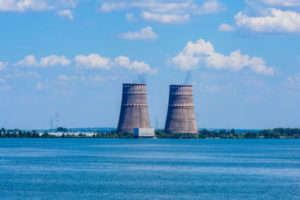
Cooling towers of Zaporizhzhia Nuclear Power Station near city Enerhodar, Ukraine. By Ihor Bondarenko @ Shutterstock.com
According to Victor Gilinsky and Henry Sokolski in Foreign Policy, Russia’s occupation of the Zaporizhzhia nuclear power complex is not necessarily a “violation” of the Geneva Convention rules, but the rules state that combatant nations should “endeavor to” avoid such situations. They write:
Using a surrounding population as a human shield to protect a military force operating from a civilian reactor is specifically addressed in the 1977 Additional Protocol I to the 1949 Geneva Convention. Until the Russian invasion of Ukraine, no one had imagined it would be a provision that needed enforcement.
Article 56 of Additional Protocol I identifies nuclear power plants, along with dams, as “installations containing dangerous forces.” Such plants “shall not be made the object of attack” if “such attack may cause the release of dangerous forces and consequent severe losses among the civilian population.” Violation of this prohibition is a war crime.
Attacking any “civilian object,” whose destruction offers no “definite military advantage” is already forbidden by Article 52. The point of Article 56 is that even if there is such an advantage, an attack is forbidden if it may cause “severe losses” to civilians.
Concerning the “human shield” case, Article 56 adds that, “Parties to the conflict shall endeavor to avoid locating any military objectives in the vicinity of the works or installations,” in this case, nuclear power plants. This is not an absolute prohibition: “endeavor to” is an instruction whose violation is not a war crime. Nevertheless, it is an instruction and at the very least Russia should be called out—in the context of the Geneva Convention augmented by the 1977 Additional Protocol—for militarizing the Zaporizhzhia site.
We cannot, however, ignore a legal difficulty in applying the Additional Protocol. Ukraine has ratified it, but Russia withdrew its ratification in 2019. Putin complained that the risks “are increasingly significant” that the international commission set up to investigate war crimes against civilians, on which Russia was not represented, would abuse its power.
Unfortunately, the United States has not ratified the Additional Protocol either. It is not a direct participant in the Ukraine war but it plays an important role. Its position is significant when it comes to treating the Additional Protocol and its prohibition on attacking nuclear plants as established international law.
If you’re willing to fight for Main Street America, click here to sign up for the Richardcyoung.com free weekly email.





